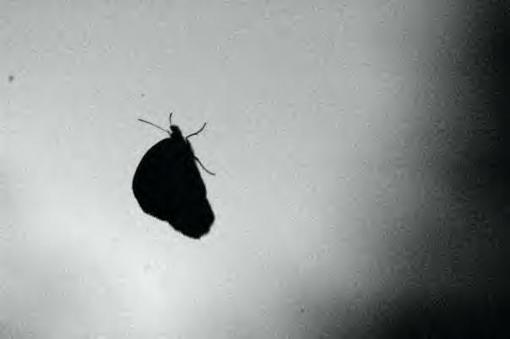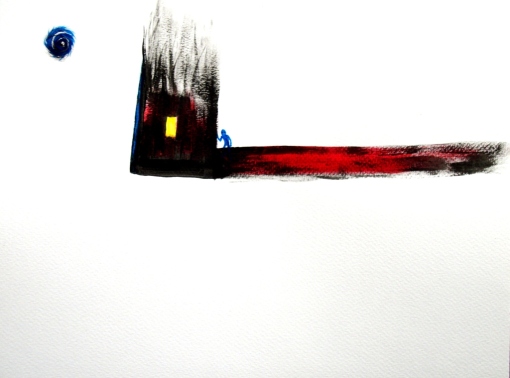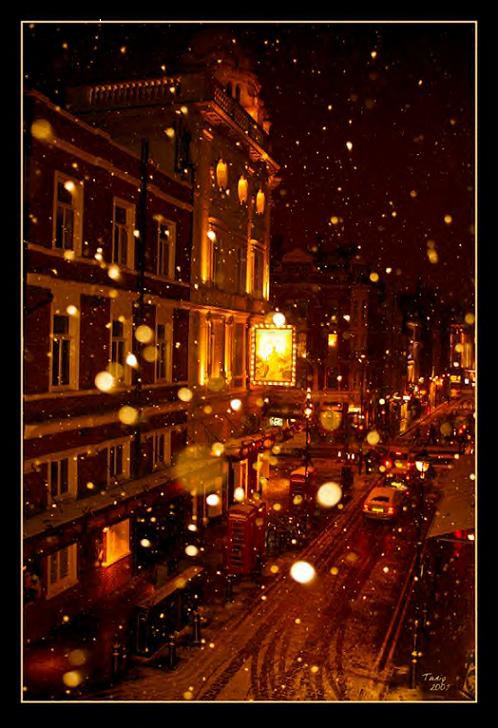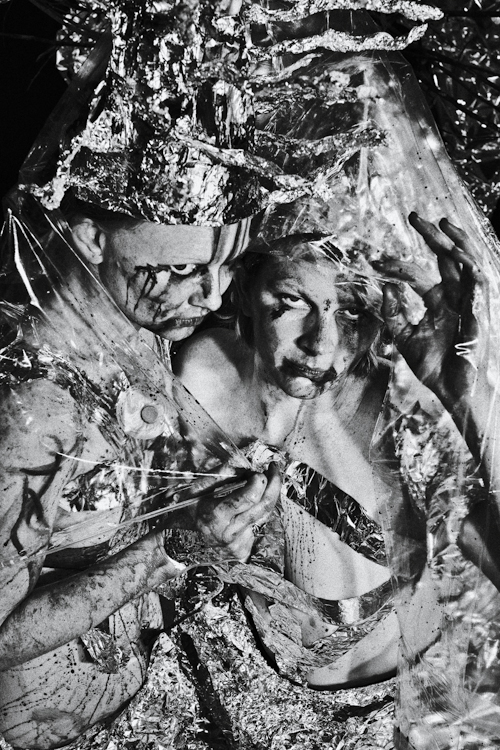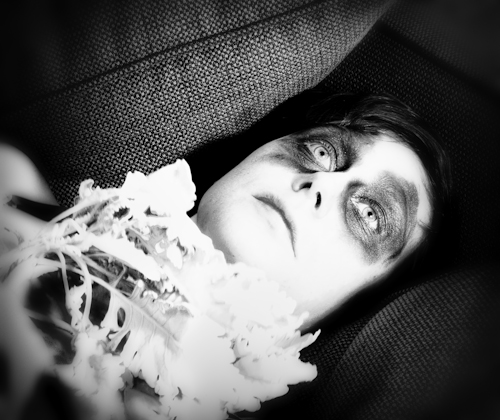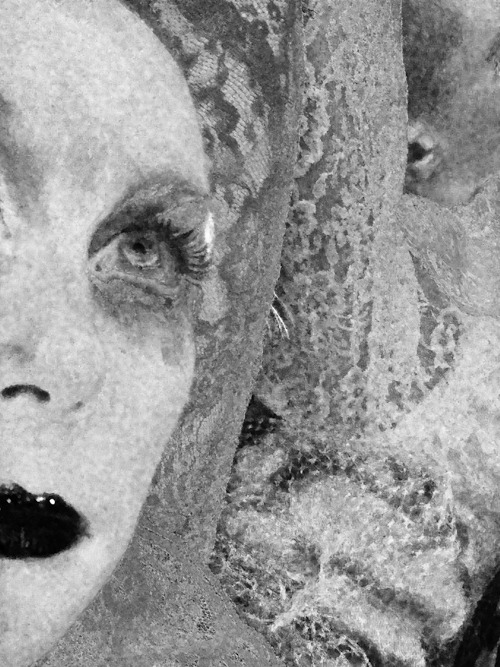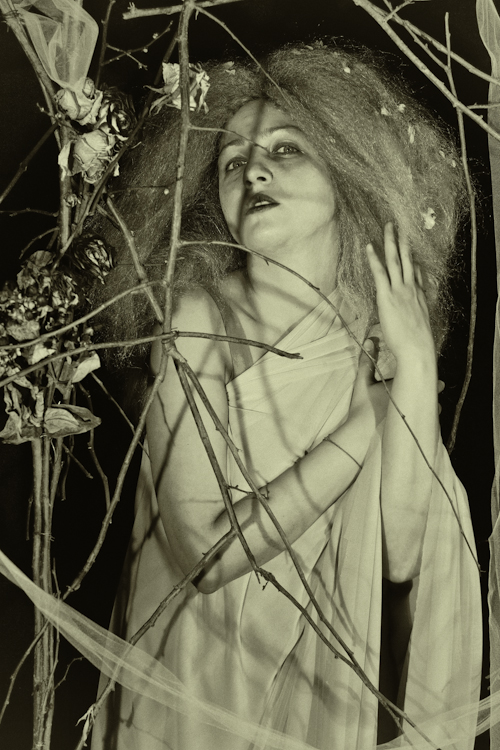Art by IRA JOEL HABER/Words by PETRA WHITELEY
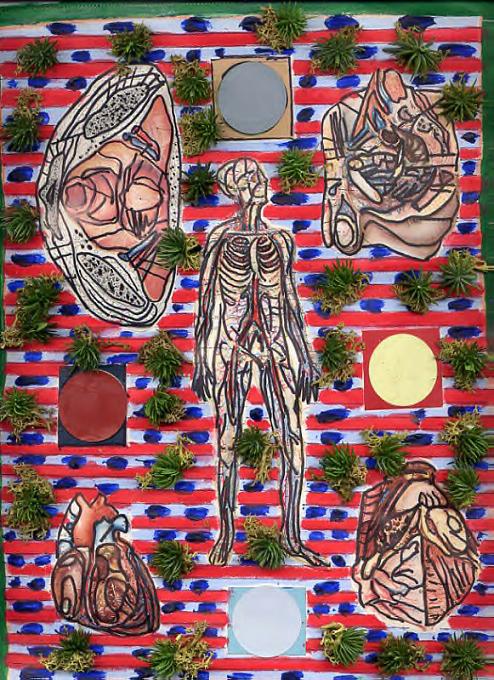
Sapiens (be)fallen
The dialogue of hardened hands
is spoken through the cracks in skin,
the body is the night of glass with horizons sharpening.
The dialogue of darkened eyes
is stillness of afternoons, the heavy sound of sun,
hanging from dried mouth – the nails of mind, weighing.
Time’s weighing down the drumming
heart’s monologue and its own answers of blood
in the fast, tight fist of light and its prolonged suffocating absence.
The rhythm between silence and sound
is the breath’s weakness through the loyalty of lungs, miracles
of twins blossoming electricity of pain and endorphin religion rushes.
The monologue of aging, the monologue of death,
the architectural bends in anatomy of the maps, the world,
unanswered and reactionary, the communion of perpetual suicide.
It’s so hard to understand the vacuum of colours, the void of flesh.
The charcoal post-mortem of mannequins sipping teas outside in the storm
is punctuated by directions of wind.

Flowers of Fire
This is the crest of a day without the silence of the sun.
I turn the face that burns itself through into the lighthouse mind of me inside and out. I touch its contours and stretch them out, neatly and tenderly; pull it all together with the pin of the seas and wind softened whispers, they are bouncing on my skin and sinking into me, silverly. There is a voice now, a voice like dark wood and red waterfall. The mahogany, pungent sighing of fire. It communicates moments of future, of risks we took in entering our palms and the legends imprinted deeply and blackly, alphabet of decades, centuries of thunders. Calligraphy of flowers and the grace of your piercing eyes, the blankets of darkness I found in them and kissed.
Can you feel their coming, can you feel the inevitable flame flow, Phoenixian length of our flesh combined and pulsing?
It has torn away from the root of words into rustling linen of victories, the sharp pang contrast of thoughts – the fusion of flowers and the knifing longing aching in the black furs of night.
It has a shiver and wildness in exploding fingers of the sun, they crush into me like tides and in there I see your feline face in new reality. We are changing the immense plains of snow and dusty rags of shadows splayed agony on white and like stones we bury them in the crevices of time and walk on through to the other side. Every word bursts forwards to solstice and every step burns the equinox. We are finally seasoned beyond hell.
for P.V.

The Gift of Cat’s Eyes
The start of summer.
The constant and closest explosive matter that pulls out all the chemicals into their symmetries of reactions, is pitched brazenly in the pale blue sky of the morning. Rays are coming from afar, there is a bite of coldness in them, but they are soft, they do not stick into the skin like needling kiss; they will be so later as day goes through the cogs of hours. My bones are trying to talk but I hear birdsongs instead. Maybe this is good. Maybe it’s good to know that I am not the sum of the parts, but some abstract word as consciousness, that word can give immortality to all and instead of death, in it we are all equal, or could be, but the ‘could be’ is only one small afterthought. Is…, is the best of illusions, we all know that…in our bones. But who listens to them?
I only hear my bones when there is pain, and see their pain that one time in future, when the bones of my foot will be exposed under the blood and torn flesh, it will look milky and translucent and I’ll walk with the exposed wound to the hospital, a liquid cross and pushchair in front of me, my child, speaking soothing murmurs. If Christ was Christ, that’s how the word to Lazarus would have sounded like.
The tracks and the stones smell of diesel and piss. The crowd of people, who are waiting for the tracks to be connected to the body of the train to board it, is only small and silent. Only few words pass around. The singy sounds linger on, crushing into the concrete and the green paint of the benches, empty words always fall down and begrudgingly dissolve back into the void, they will never pierce the flesh and stay lodged as corpses in the living grave, neither are they like words that resurrect those living graves into crimes of breathing art.
I sit on the bench, I look into the trees on the other side of the platform, although they cannot go anywhere, I wonder if they travel through their roots into the imagination of the planet and what would they become there? I suspect them of many things.
A frightened cat limps around, circling wide from the bodies on the pavement, she knows only the perfect elicit sympathy, whatever they say in those buildings, houses, open spaces, the only God of humanity is Atrophy. After all we have cyanide, Novichok 5, Substance P, Ricin, Anthrax, modified and tailored viruses and bacteria, not cure for HIV and cancer. We have very useful words: “law enforcement including domestic riot control purposes.”; “incapacitating agents and associated delivery systems”; “an acceptable addition to military arsenals”. Whilst words can have blood and bones and burst forth with electricity and life, even those we know how to maim, torture and kill.
The cat comes and sits right in front of me. As it comes close to me I notice its eyes. One of the eyes is an eye that was, it’s a gaping badly healed hole, and dirt hangs there. The other eye is swollen, twice the size it was at some point of the animal’s past, and a film swims over it, it has a cataract and it is blind, yet it sits there and stares at me. I feel that the exposed nerve there somewhere in the crater, is sending signals to both our brains. I see people looking at the spectacle and making polite steps away. The cat is an omen and they see me as a demon chosen child. Maybe they are praying for their Christ to come yet again and cure the lepers so they would be saved from the hell upon earth of such an irregularity, of such a sight. I want to be saved from them. If only so I could hear the cat through her eyes because in this noise of fear, the only thing I want to do is run. Take the cat with me, but I know it will not come. It moves when I move, it moves away, but it does not run, only mirrors the unspoken.
The train comes and everything becomes one fusion in the flash, now the cat does run and is gone, somehow managing to negotiate the bodies and the metallic beast that has arrived now, I step out too, about to be swallowed into it and be taken for my summer holidays away from home.
When I sit down I try to see if the cat is still out there, but I see nothing. As the train pulls out and I keep looking from the window at the moving landscape with its houses, the houses with the people folded neatly inside them flipping in the breezing draft of the windows open to the rising sun, it all soon melts into something…
I feel myself heavy in the bed, unmoving, only something rattling, rattling; and there above me a shape, darkly grey, bent over me. I hear thunder and earth from that contour hanging above me intently, my mouth waters and I try to see through my blunt eyes, the woman there staring at me. Although there are only stumps for her arms, she is reaching for me.
I feel no fear.
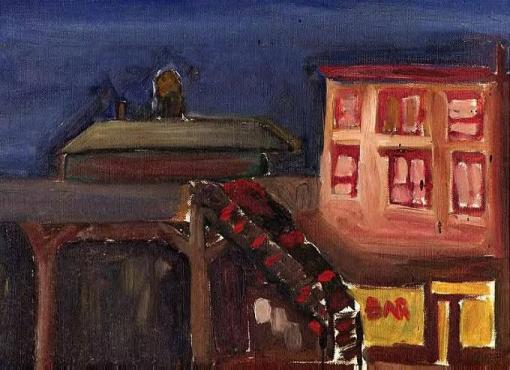
Exiting Flash(back)
The light is twisted inward blue-black,
life will not touch the uneven surface,
there will be ( )
And ….
No exit. Whispers and Shadows. Spoken
im(ages)
possibilities Endless inescapable
windows to circular nowheres. Blood on the stairs
to coffins for no
bodies.
Treacherous
beliefs and contrasts surviving in raisins of colours, their
secrecy and absent children,
crying
inwardly. Always the way
in. UnOut is the Past. Enter to dis-
appear, unsailable ships from the shores, the flash
backs of burns and bruising. The cavernous eye
is the only lighthold to pull through deathly
air of objects.

Bisection of no(w)
Can you hear the life of walls
straight down to withered skin’s cut through?
When you cannot believe life
out(in)side within your own eyes?
It morphs into empty bullets
of stories inside the empty televised heart,
spins the void centrifugal onto the body nesting
spilling unknown territories, declining in round silences.
Dawning the new men one after the other,
facelessness – the sun sunk into red river.
Dust teeth of bones (in)visibly
bite into the liver
the lonely image follows one another
in perpetual struggle to itch blood from
hems of shadows sown into redness,
those knots of disasters defining state
of war and redemption intoxication
– can they take it all away? Force-
feed exile of spleen, lacking backbone –
– a gift to twins, tending
to exit into the debris of nerve tissues.
So tired of (un)living, swallow
death. Or sleep.
_______________________________________________________________
Presented by Walter Conley.
_______________________________________________________________
Petra Whiteley is an author of The Nomad’s Trail (Ettric Forest Press, 2008) and The Moulding of Seers (Shadow Archer Press, 2009), her poetry and prose appeared in Seven Circle Press, Apt, Eleutheria, Full of Crow, Unlikely Stories 2.0, Paraphilia, The Recusant, Clockwise Cat, The Plebian Rag, Counterexamplepoetics, Weirdyear, Disenthralled, Danse Macabre and has been featured in Outside Writers Collective. Whiteley’s articles/reviews on political/current issues, essays on history and methods of poetry and literature movements, current poets and lyricists had appeared & will appear in the Glasgow Review, Osprey, and Eleutheria. Her poetry is due to appear in an ‘Into The Valley Of Hinnom’ anthology published by Heliocentric Press.
* * *
Ira Joel Haber was born and lives in Brooklyn New York. He is a sculptor, painter, book dealer and teacher. His work has been seen in numerous group shows both in USA and Europe and he has had 9 one man shows including several retrospectives of his sculpture. His work is in the collections of The Whitney Museum Of American Art, New York University, The Guggenheim Museum, The Hirshhorn Museum & The Albright-Knox Art Gallery. His paintings, drawings and collages have been published in many on line and print magazines including Rock Heals, Otoliths, Winamop, Melancholia’s Tremulous Dreadlocks, Barfing Frog, The Raving Dove, Foliate Oak, Siren, Prose Toad, Triplopia, Thieves Jargon, Opium, Dirt, The Centrifugal Eye, the DMQ Review, Broadsided, Hotmetalpress, Double Dare Press, Events Quarterly,Unlikely Stories, Coupremine,Cerebration,Chick Flicks, Softblow Eclectica Magazine Backwards City Review,Right Hand Pointing, Ascent Aspirations Magazine, Brew City Magazine, Fiction Attic, Blue Print Review, Ellipsis,The Indelible Kitchen, Cricket, Entelechy, So To Speak, Taj Mahal Review, The Fifteen Project, The Externalist, Why Vandalism,Mungbeing Magazine, Lamination Colony, Paradigm, Lily, Literary Fever,Glassfire Magaine,The Houston Literary Review, Lilies and Cannonballs, Wheelhouse Magazine, Terra Incognita,Qarrtsiluni, The Tusculum Review, Multidementional, 34th Parallel, Wood Coin & Sacramento Poetry, Art & Music & Divine Dirt Quarterly. Over the years he has received three National Endowments For The Arts Fellowship, two Pollock-Krasner grants and most recently in 2004 received The Adolph Gottlieb Foundation grant. Currently he teaches art at the United Federation of Teachers Retiree Program in Brooklyn.
You can view more of Ira Joel Haber’s work HERE.
_______________________________________________________________
Submissions will CLOSE May 31, 2010.
There are several issues in the works.
Please address all correspondence to disenthrallers@gmail.com.
Rights to the above material and presentation are held by the respective creators. Do not reproduce without express written consent.

